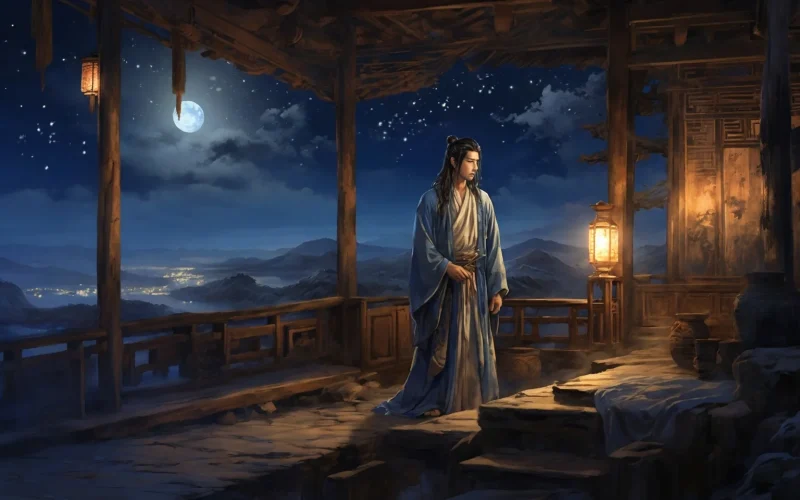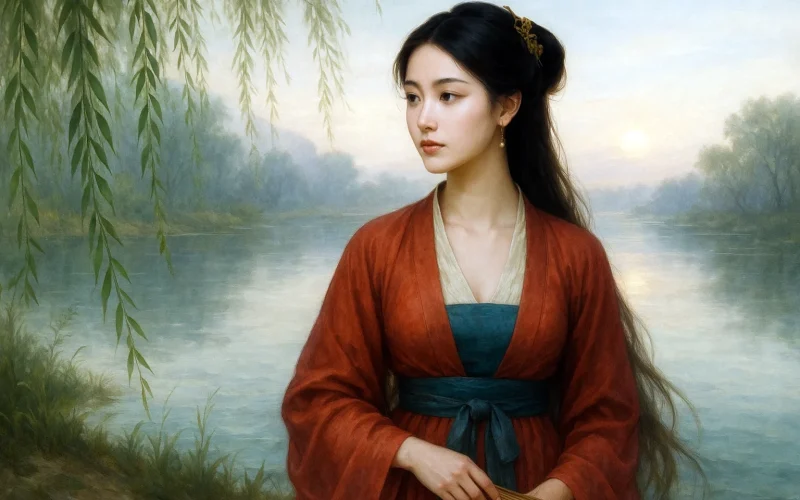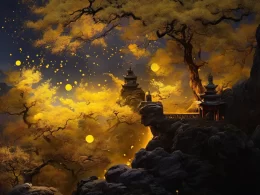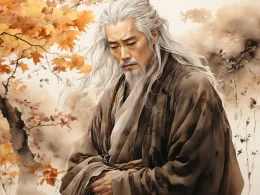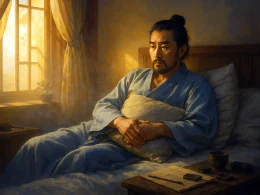When tired of breaking willow branch before my bower,
I pluck at leisure by poolside the lotus flower.
I cannot find your face when I ride on my horse,
But hear the cloud echo war cries of combat force.
Original Poem
「秋思赠远二首 · 其二」
王涯
厌攀杨柳临清阁,闲采芙蕖傍碧潭。
走马台边人不见,拂云堆畔战初酣。
Interpretation
Composed during Emperor Muzong's reign while serving as military governor of Dongchuan, this poem reflects Wang Ya's profound personal emotions interwoven with frontier realities during prolonged separation from his wife. Through landscape imagery and subtle expression, it reveals both deep affection and steadfast commitment to duty.
First Couplet: "厌攀杨柳临清阁,闲采芙蕖傍碧潭。"
Yàn pān yángliǔ lín qīng gé, xián cǎi fúqú bàng bì tán.
Weary of willows plucked by riverside towers, I gather lotus idly by jade pools for hours.
The opening conveys emotional exhaustion through the verb "weary" (厌), rejecting the traditional willow-breaking farewell gesture. The lotus-gathering (芙蕖) by emerald pools presents a seemingly casual but deeply symbolic act - the lotus representing both marital purity and unspoken longing.
Second Couplet: "走马台边人不见,拂云堆畔战初酣。"
Zǒu mǎ tái biān rén bú jiàn, fú yún duī pàn zhàn chū hān.
The horsemen's terrace stands devoid of faces known, While at Cloud-Swept Mound, battle's fury has grown.
The couplet shifts dramatically from private melancholy to public duty. The vanished companions at the riding terrace (走马台) symbolize personal losses to time, while the intensifying conflict at Cloud-Swept Mound (拂云堆) demands present attention. The "battle's fury" (战初酣) captures both military urgency and the poet's divided heart between familial love and national responsibility.
Holistic Appreciation
With exquisite craftsmanship, the poem progresses seamlessly from delicate sentiment to austere reality. The opening couplet paints a portrait of domestic yearning through a pining wife's perspective, while the latter depicts the tense atmosphere of border warfare. This structural counterpoint—oscillating between private devotion and public service—creates resonant emotional tension. Rather than explicit lamentation, the poet conveys restrained intensity through quotidian details and frontline verisimilitude, building layered psychological depth. Mournful yet never maudlin, somber yet disciplined, the work balances heartfelt emotion with solemn duty, standing as a paradigm of frontier poetry that intertwines personal and political dimensions.
Artistic Features
The poem masterfully blends personal emotion with frontier realities. The first couplet employs imagery like "willows" and "lotus" to convey tender longing, achieving a poignant fusion of scene and sentiment. The second couplet shifts abruptly to military urgency through place names like "Galloping Horse Platform" and "Cloud-Sweeping Mound," creating stark contrast between private affection and public duty. This organic transition from lyrical softness to martial vigor demonstrates the poet's concise yet evocative language, revealing both profound emotional attachment and unwavering commitment to national responsibility—a duality that reflects his strategic acumen as a military leader.
Insights
This poem reveals how profound emotion and weighty responsibility can coexist at life's crossroads. Wang Ya navigates the tension between personal longing and official duty without losing his bearings, transmuting inner conflict into art while answering duty's call. It teaches us that authentic feeling transcends mere sentimentality—it is the fortitude to remain steadfast amidst chaos, to cultivate quiet strength under pressure. In an era where borders demanded blood and letters bridged impossible distances, this work reminds us that the truest affections are those that endure, unbroken, between the lines of what must be done and what the heart cannot forget.
Poem translator
Xu Yuanchong (许渊冲)
About the Poet
Wang Ya (王涯, 764 - 835), a native of Taiyuan in Shanxi Province, was a Mid-Tang statesman and poet. He attained the jinshi degree in 792 (the eighth year of the Zhenyuan era) and served six successive emperors from Dezong to Wenzong, rising to the position of chancellor and receiving the title Duke of Dai. Most of his poetic works were composed for court occasions, reflecting the typical ornate style of Mid-Tang official poetry. In his later years, he was implicated in the "Sweet Dew Incident" (Ganlu zhi bian), accused of rebellion by the powerful eunuch Qiu Shiliang, and executed by waist-cutting in the marketplace.
Consequently, much of his work was destroyed. The surviving poems primarily represent his early courtly compositions, exemplifying the characteristic taige (cabinet) style of the Mid-Tang period.







